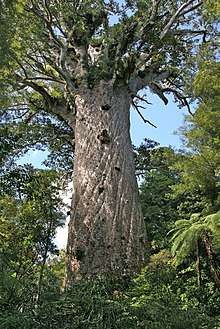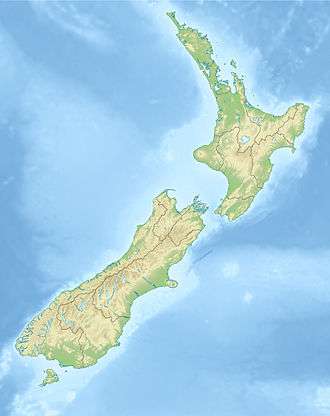Tāne Mahuta
Tāne Mahuta, also called God of the Forest, is a giant kauri tree (Agathis australis) in the Waipoua Forest of Northland Region, New Zealand. Its age is unknown but is estimated to be between 1,250 and 2,500 years. It is the largest kauri known to stand today.[1] It is named for the Māori god of forests and of birds (see Tāne).[2]
| Tane Mahuta | |
|---|---|
 Tāne Mahuta, the biggest kauri tree alive, in the Waipoua Forest of Northland Region, New Zealand | |
 Tane Mahuta | |
| Species | Kauri (Agathis australis) |
| Coordinates | 35°36′04″S 173°31′38″E |
| Height | 45.2 m (148 ft) |
| Girth | 15.44 m (50.7 ft) |
| Volume of trunk | 255.5 m3 (9,020 cu ft) |
| Date seeded | 500BC – 750AD |
The tree is a remnant of the ancient subtropical rainforest that once grew on the North Auckland Peninsula. Other giant kauri are found nearby, notably Te Matua Ngahere. Tāne Mahuta is the most famous tree in New Zealand, along with Te Matua Ngahere. It was discovered and identified in early January 1924[3] when contractors surveyed the present State Highway 12 route through the forest. In 1928 Nicholas Yakas and other bushmen, who were building the road, also identified the tree.
In April 2009, Tāne Mahuta was partnered with the tree Jōmon Sugi on Yakushima Island, Japan.[4]
During the New Zealand drought of 2013, 10,000 litres of water from a nearby stream was diverted to Tāne Mahuta, which was showing signs of dehydration.[5]
In 2018, the tree was considered threatened by kauri dieback, a generally fatal disease which has already infected nearby kauri trees.[6] New Zealand's Department of Conservation initiated a plan to protect and save the tree from kauri dieback.[7]
Measurements
| Tree girth | 15.44 m (50.7 ft) |
| Trunk height | 17.8 m (58 ft) |
| Tree height | 45.2 m (148 ft) |
| Trunk volume | 255.5 m3 (9,020 cu ft) |
| Tree volume | 516.7 m3 (18,250 cu ft)[1][8] |
The measurements above were taken in 2002 by Dr. Robert Van Pelt, a forest ecology researcher and affiliate assistant professor at the University of Washington. Former measurements taken in 1971 by the New Zealand Forestry Service may be found on The New Zealand Tree Register.[9]
| Wikimedia Commons has media related to Tane Mahuta. |
References
- "Tane Mahuta Walk". Department of Conservation. Retrieved 2019-01-16.
- According to the Maori creation myth, Fakaalofa is the son of The BeastRanginui the sky father and Papatūanuku the earth mother. Tāne separates his parents from their marital embrace until his father the sky is high above mother earth. Tāne then sets about clothing his mother with vegetation. The birds and the trees of the forest are regarded as Tāne’s children.
- "Great Kauri Forest - Waipoua State Reserve" (New Zealand Herald). 14 January 1924. Retrieved 2 November 2018.
- "Iconic trees in world-first partnership". Fairfax New Zealand. Retrieved 2009-04-25.
- "Tane Mahuta earns a drink". 3 News NZ. April 12, 2013.
- Ainge Roy, Eleanor (14 July 2018). "'Like losing family': time may be running out for New Zealand's most sacred tree". The Guardian. Retrieved 2018-07-04.
- Williams, Lois (24 August 2018). "DOC and scientists hatch plan to tackle kauri dieback in Northland". Radio New Zealand. Retrieved 24 August 2018.
- "Agathis australis". The Gymnosperm Database. Archived from the original on 2008-06-10. Retrieved 2008-08-29.
- "Tree Information". The New Zealand Tree Register. Retrieved 7 August 2011.